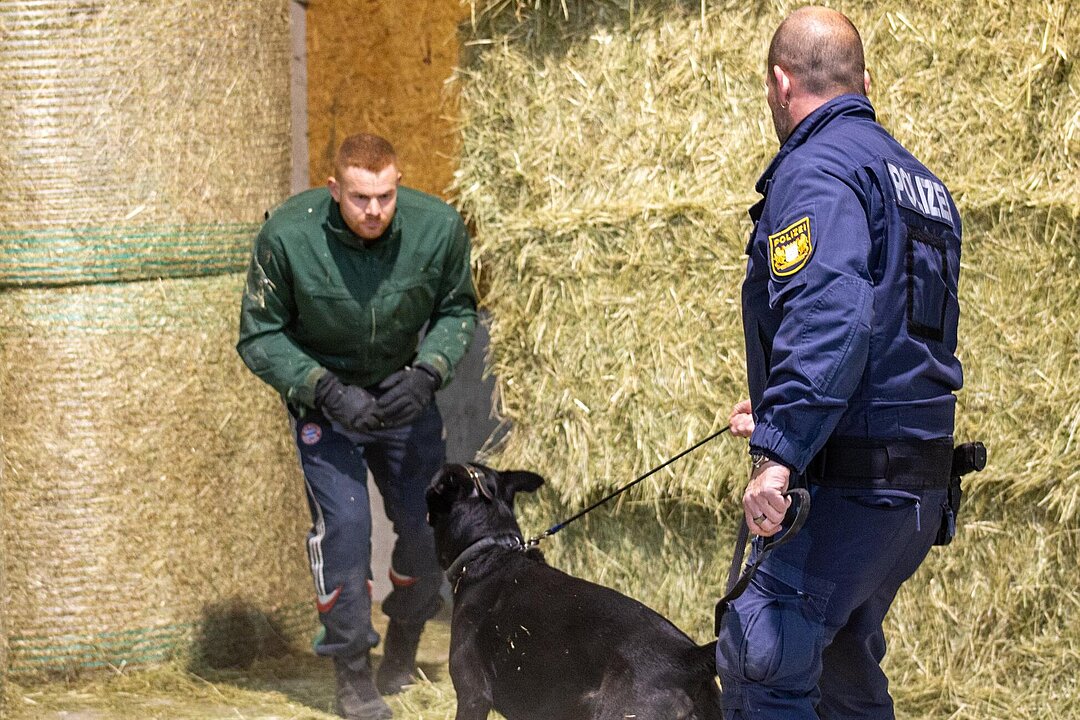![[Translate to English:] [Translate to English:] Polizei Hundestaffel im Tierpark Hellabrunn](/fileadmin/_processed_/d/e/csm_tierpark-hellabrunn-polizei-hundestaffel-suchen-anlage_1721c51d0c.jpg)
Last week Hellabrunn Zoo welcomed a special group of visitors: the Munich Police Dog Unit.
Five police officers and their trainee service dogs arrived at the zoo to complete one of their final training sessions, which involved learning to distinguish a variety of different and unusual smells. The training session, which took place in the evening, saw police dog handlers wait until it was dark before hiding samples of drugs, money and explosives outside of the Elephant House. The elephant residents had already retired to their animal house by the time the canine guests arrived and barely noticed any of the activity in their outdoor paddock.
The dog handlers hid the contraband items in several hiding places around the paddock – spots that are also occasionally used by the keepers to hide treats for the pachyderms – for the dogs from the Munich Police Dog Unit to sniff out. As part of their training, the canines are taught how to detect a variety of substances and to report their discovery to their dog handler by barking. Their challenge at Hellabrunn Zoo was to find the substances despite the intense elephant odour.
The evening training session was an exciting and varied experience for both the dogs and the police officers supervising them - for some it was their first time at the zoo! Before heading to the Elephant House, the dogs were brought to two other facilities for additional sniffer training exercises: a large fodder shed where hay and straw are stored and an empty animal enclosure.
Inside the vast shed, the officers practised finding and apprehending a burglar with their respective service dogs, which involved a lot of loud barking. Apprehending a person and preventing them from escaping gives a trainee canine an absolute sense of achievement - and is one of the most important tasks for a police service dog.
The empty enclosure used for training was previously inhabited by the zoo’s markhor goats. Here, the dogs’ task was to find a person hiding within the enclosure and to make their presence known to their respective handler. This task was somewhat more difficult than the training exercise in the shed due to the wide range of smells in the barn and the many potential hiding places.
The entire training took place in several rounds, with each of the five trainee dogs taking individual turns. Of course, with breaks in between - during which the tiger in the enclosure opposite was often inspected: Can he also join as a police dog?
The Munich Police Dog Unit has 51 service dogs. The canines undergo two years of training, after which they serve on the force for around eight years. During this time, they play an important role in the search for criminals, weapons and illegal substances. Service dogs live together with their handler throughout their entire period of service and beyond, forming a strong team.
“The visit to Hellabrunn Zoo was certainly a special experience for the dogs. After all, there are a variety of smells here that are hardly found in any other place in Munich,” said zoo director Rasem Baban. “That is why we are happy to offer the Munich Police the opportunity to train the animals here. After all, we know how important it is to give animals the right training in order to ensure they are able to work with you.”
At Hellabrunn Zoo, a number of animals, such as lions, elephants, South American sea lions and polar bears, are trained by keepers to respond to commands that enable the animal care staff to carry out minor medical examinations. The daily training exercises also enrich the lives of these animals.
Gender disclaimer: Gender-specific terms may be used in this text for better readability. Whenever a gender-specific term is used, it should be understood as referring to both genders on equal terms.
